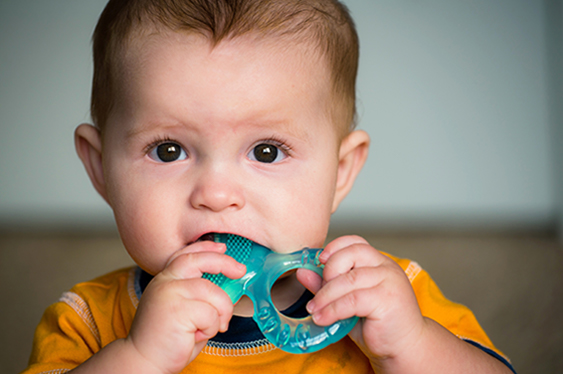Your child’s first tooth coming in is a major milestone during infancy. Before that first tooth erupts from the gum line, your child may exhibit symptoms of teething to give you the hint that their smile is growing. At Ashby Park Pediatric Dentistry, our expert pediatric dentists are here to help you and your child conquer the teething stage and be excited for a lifetime of healthy smiles!
When Do Babies Start Teething?
According to the American Academy of Pediatrics, most babies begin teething between 4 and 7 months of age, with their first tooth coming in between 7 months and 1 year of age. Each child is different, and in some cases, a baby may be born with their first tooth. Your child’s pediatric dentist will be able to help guide you to soothe your teething baby once the symptoms begin.
5 Common Symptoms of Teething
Every child may experience teething differently. There are many symptoms your child may exhibit while teething. The most common symptoms of teething are:
- Irritability and crying: A noticeable change in mood is the most common symptom of teething. Due to the erupting tooth agitating the gum, your child may be irritable, fussy, and cranky from the discomfort.
- Drooling more than usual: Excessive drooling is very common and can begin early in the teething process. This can potentially cause a rash on a child’s face, so talk to your child’s pediatrician about the best way to help if the rash occurs.
- Excessive biting and chewing: Biting and chewing may help soothe the tooth pain or discomfort your child is experiencing from the erupting tooth.
- Changes in sleeping and eating habits: Because of an aching tooth or sore gums, the discomfort of teething may cause a change in sleeping and eating habits for your child. Feeding may irritate sore gums –and sleep may be disrupted from tooth pain.
- Ear pulling/Cheek rubbing: As your child goes through the teething process, they may pull on the ear or rub the cheek on the side of the face where the tooth is coming in. Your child may feel the tenderness or pain in the cheek or ear due to connected nerve pathways.
Your child may exhibit other symptoms, such as a low-grade fever. Your child’s pediatrician and pediatric dentist will work with you on the best remedies for your child’s teething symptoms.
Order of Baby Tooth Eruption
Once the teething process begins, you may wonder which order to expect to see baby teeth erupt. Typically, the bottom front teeth are the first teeth to emerge, followed by the top front teeth. Next, your child’s lateral incisors, the teeth next to the bottom and top front teeth, will erupt around 9 to 12 months of age.
After 1 year of age, you’ll begin to see their molars erupting, and by age 2 their canine teeth will emerge. Around 2 and a half years of age, your child will most likely have their full set of baby teeth.
Remedies for Soothing Your Baby’s Pain
When your baby is actively teething, it is a parent’s instinct to want to help their child feel better. There are many home remedies for soothing your baby’s tooth pain that will have your child happy, smiling, and pain-free once again. Our dentists recommend the following remedies:
- Teething rings: Teething rings or toys are a great way to help relieve your child’s teething pain while they play. By biting down on the rings, it applies counterpressure to your child’s sore tooth, relieving the pressure of teething.
- Massage with a washcloth: Parents can take a wet washcloth to massage their child’s sore gums to help relieve the discomfort of teething. Massaging your child’s gums may help breastfeeding be more comfortable for both you and your child.
- Children’s pain reliever: If massaging or teething rings are not alleviating discomfort from teething, try a small amount of children’s pain reliever. For children over 6 months old, a small dose of children’s ibuprofen or acetaminophen can help your child feel better and get back to happy smiles. Talk to your child’s doctor before using over-the-counter pain relievers for teething.
Our dentists and the American Academy of Pediatrics do not recommend the use of teething necklaces for your child’s safety. Teething necklaces can be dangerous when worn around a child’s neck and the beads are a choking hazard. If you choose to use a teething necklace, put it around your child’s wrist or ankle instead and watch them while it is being used.
Consult a Pediatric Dentist about Teething
At Ashby Park Pediatric Dentistry, our expert dentists are here for you before the first tooth comes in, and well after adult teeth take their place. Schedule a dental visit in Anderson, Greenville, or Easley today, and we’ll get your child started on a lifetime of optimal oral health!


 Find Us
Find Us